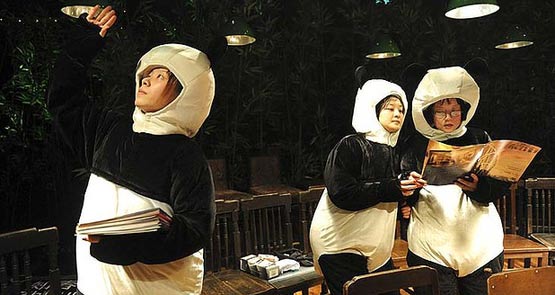
Ah, Carriageworks. You never quite know what you’re going to get. And, I must say, that element of relative surprise is one of the things that draws me back, like a magnet. We don’t get to see much Chinese theatre in this country, despite our official determination to upgrade our trade. Fight The Landlord (Do Di Zhu) is both a card game and, now, a theatrical work, co-produced by Carriageworks, Pan Pan Theatre, Ireland (of all places) and Beijing Square Moon Culture. The moon may be as square as that prime boxhead that legend has it is now the PM, but the large card table plonked in the much larger still Carriageworks bay was as round as the Treasurer once was.
Sun Yue has written and Gavin Quinn (co-founder of Pan Pan) directed this piece, designed by Aedin Cosgrove (his partner, in Pan Pan) and Gao Yiguang. Sun also performs, alongside Wang Jinglei and Zhu Yutong and, it must be said, much of the appeal and interest of the work lies in their charismatic presence. When they put on their panda suits, we have to confront our own backsliding into stereotypes, as we intone, “aw, aren’t they cute?!”. It’s a powerful moment; in retrospect, if not while you’re standing in it. This, because it results in an acute awareness of and awakening to persistent prejudice.
Fight The Landlord, the card game, emerged in the 1980s and went on to become China’s favourite card game. It’s a classic “shedding” game: the object, to divest oneself of cards ahead of one’s opponents. It’s reputed to be easy to learn, but hard to master. That’s as may be. Here, it serves as a metaphor; perhaps a rather heavy-handed one. It relates to the Cultural Revolution, during which time peasants were authorised, if not downright encouraged, to violate the human rights of their landlords. The irony, of course, is that the current generation among whom the game is so popular know, ostensibly, nothing of this. They certainly have no direct experience of it. In fact, the tables have turned. Landlords are again regarded as legitimate and aspirational, rather than filthy capitalist pigs. They may even be regarded (and not without reason) less favourably down under.
How all this relates, exactly, to what takes place on stage, which involves numerous hands of Do Di Zhu, is anyone’s guess. At the risk, perhaps, of perpetuating another stereotype, it’s a little inscrutable. To be honest, I was more taken with the very idea of having projected surtitles (it’s almost exclusively in Mandarin, so I couldn’t help thinking how much KRudd would’ve enjoyed it, laughing in all the right places, at all the right moments) and the design, which affords audience members seats at the table, if they should choose to accept them. This may be part of the idea: the softening of the original hard line of Mao’s China, to the point where outsiders, Westerners, capitalists, are allowed access. The forest of plastic trees that surrounds the table, too, may be alluding to the plasticity of politics, in all senses (artificiality and pliability). It’s really the free-ranging conversation the pandas enjoy, which covers everything from celebrities to property, love, babies, parents, wages and bling, that creates the tension. Have China’s earlier principles (regardless of their intrinsic morality) and values been compromised to such an extent they’ve become indistinguishable from our own? Or is it that gen Y is, in practice, so far removed from its government and elders they’ve gone global; politically, socioeconomically and culturally AWOL? Or both?
More broadly, FTL raises the question of dissonance between our understanding of China (the China we imagine, based on historical prejudices and disinformation, as well as the mediated China reported to us) and the China that is. Example: my companion and I, afterward, were discussing the likelihood the piece had been adapted for Australia, as we couldn’t imagine such a brutal critique going down so very well with the Chinese authorities. While it seems clear there may’ve been some idiomatic tweaks, the word from those close to the cast is the powers that be had no issues and that there’s been no spectre of censorship whatsoever; a contention I’ve ever reason to believe and only the merest to doubt.
This tends to rock the leaky boat many of us sail on our slow trip to the real China. We’re prone, perhaps, to seeing China in sociopolitical stasis, rather than as the dynamic powerhouse it actually is. Probably because it’s a world view that more-or-less compels us to surrender our ‘occidental, on-purpose’ superiority complex, for one thing. And also ’cause we just can’t keep up. Producer Zhaohui Wang has, pretty clearly, determined to challenge us along these lines. And succeeded, admirably.
Then again, maybe I’m reading too much into it. Maybe it’s just a blip on the screen of a new wave of theatre: blackly humorous; absurdist; gently interactive; playful; naughty, rather than provocative; setting out, in a haphazard, organic way, to look at life, in China and beyond. It has something, I know that. I’m just not entirely sure what that something is. But, again, I’m keen to see more from this unlikely Irish-Chinese buddy-up.
The details: Fight The Landlord played Carriageworks on October 2-5.







Crikey is committed to hosting lively discussions. Help us keep the conversation useful, interesting and welcoming. We aim to publish comments quickly in the interest of promoting robust conversation, but we’re a small team and we deploy filters to protect against legal risk. Occasionally your comment may be held up while we review, but we’re working as fast as we can to keep the conversation rolling.
The Crikey comment section is members-only content. Please subscribe to leave a comment.
The Crikey comment section is members-only content. Please login to leave a comment.